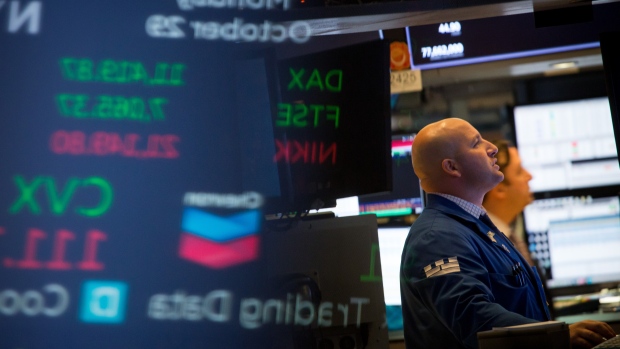Nov 2, 2018
Stocks slide as trade tensions weigh on investors
, Bloomberg News

Stocks fell as investors assessed whether the U.S. and China will be able to ease trade tensions. Apple’s poor forecast hit tech-heavy indexes, while Treasuries declined after U.S. hiring rebounded more than forecast in October.
The S&P 500 dropped for the first time in four days, though the benchmark still had its best week in six months. The index pared about half of Friday’s loss that reached as much as 1.5 per cent after President Donald Trump said he thinks the U.S. will reach a trade deal with China. Those comments countered earlier remarks by his adviser Larry Kudlow that had deepened the slide. The Nasdaq 100 paced declines as Apple retreated after underwhelming sales forecasts, while small caps edged higher.
The S&P/TSX Composite Index closed 30.87 points lower at 15,119.28.
The 10-year Treasury yield rose the most in a month to 3.21 per cent and the dollar gained as investors speculated the Federal Reserve won’t be deterred from its rate-hike path after a jobs report showed annual wage gains passed 3 per cent for the first time since 2009. West Texas crude fell below US$63 a barrel.
“Trade negotiations will continue to be front and center,” Chad Morganlander, senior portfolio manager at Washington Crossing Advisors, said in an interview. “At the same time, the jobs numbers were quite robust. This will push the Fed to continue raising rates.”
Doubts remain on the capacity of earnings to deliver. Apple’s disappointing forecast for the key holiday period suggested weaker-than-expected demand for the company’s pricier new iPhones. Next up is mid-term elections next week. Analysts also doubted the Trump administration’s ability to end the trade tensions any time soon.
Talks between the U.S. and China may not be straightforward, with intellectual property theft still a stumbling block. A Chinese state-owned company was charged Thursday with conspiring to steal trade secrets from American chipmaker Micron Technology Inc. as the Justice Department steps up actions against the Asian nation in cases of suspected economic espionage.
Elsewhere, emerging-market shares jumped the most since March 2016. The euro fell on reports that the ECB was considering new dovish measures. WTI declined as fears over a supply disruption eased after the U.S. was said to agree on giving waivers to eight nations to continue importing Iranian crude.
Here are the main moves in markets:
Stocks
The S&P 500 fell 0.6 per cent at 4 p.m. in New York, rising 2.4 per cent for the week, the best since May. The Nasdaq 100 dropped 1.5 per cent, but still saw the best week since August. The Stoxx Europe 600 Index advanced 0.3 per cent. The MSCI Emerging Market Index jumped 2.7 per cent, the biggest advance since March 2016.
Currencies
The Bloomberg Dollar Spot Index rose 0.1 per cent, gaining for the week. The euro fell 0.1 per cent to US$1.1394. The British pound dropped 0.5 per cent to US$1.2953. The Japanese yen dipped 0.5 per cent to 113.25 per dollar.
Bonds
The yield on 10-year Treasuries advanced eight basis points, the most in a month, to 3.21 per cent. Germany’s 10-year yield advanced four basis points to 0.44 per cent. Britain’s 10-year yield increased five basis points to 1.500 per cent. Japan’s 10-year yield climbed one basis point to 0.129 per cent.
Commodities
West Texas Intermediate crude slid 1.3 per cent to US$62.85 a barrel. Gold fell 0.3 per cent at US$1,234.70 an ounce. Copper increased 3.4 per cent to US$2.81 a pound, biggest rise since September.


